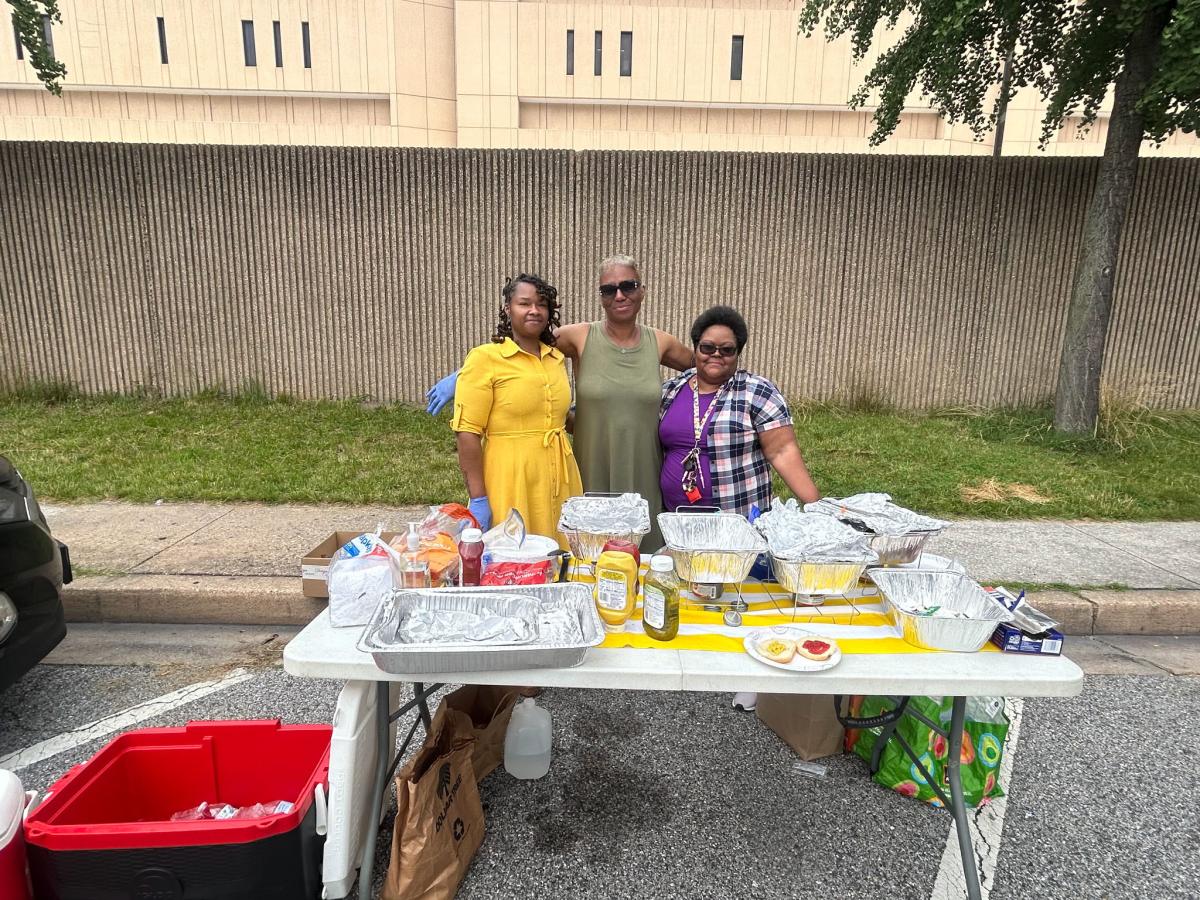 In a world that can often feel lonely or uncertain, many long for the assurance that we are never alone. Here, we share stories of those who found a welcoming spiritual home.
In a world that can often feel lonely or uncertain, many long for the assurance that we are never alone. Here, we share stories of those who found a welcoming spiritual home.
Story by Amanda Blake
Romita Mandal had known Mr. Matthie for more than a decade. He’d been her elementary and middle school strings director, and, when she reached high school, her private violin instructor.
“Sometimes, we wouldn’t unpack the violin,” she shares. “Sometimes, I would just have a breakdown on the couch, and he would help me and be a mentor.”
Finding Home
Mandal grew up with a Hindu mom and an atheist dad. She aligned more with her dad, whom she describes as scientifically minded with no space for spirituality—yet, unlike him, Mandal believed that God existed.
Mandal independently studied parts of the Bible, including the Ten Commandments, and found it puzzling that churches didn’t worship on the seventh day.
One day, after speaking with Mandal about God, Matthie offered to spend time with her to answer any “God questions” she might have. She accepted, and they eventually began studying the Bible together once a week.
Matthie’s answers made sense to Mandal in a way her church experiences did not. As she explains it, she saw Christianity in a different light because she was learning about it through her longtime friendship with Matthie. A few months into their studies, she started attending Matthie’s church, Potomac Conference’s Living Faith church—now called Greater Than I—in Chantilly, Va.
She loved how the service was structured and how the congregation was involved in reading and discussing Bible passages. After about a year of studying with Matthie, in 2016, Mandal was baptized into the Seventh-day Adventist Church. For her, “coming home” truly is the best way to describe her experience of finding her church.
“I love that phrase, because every time I go to church, I tell people, ‘This is my home. You guys are my home,’” she says. “I haven’t always had a stable living situation. There are very few places where I have felt emotionally, physically and mentally safe, but in the Seventh-day Adventist Church, I feel like my true self.”
An Inviting Home
Like Mandal, Tracy Morgan did not grow up in a Christian household. She was raised as a Nichiren Shoshu Academy (NSA) Buddhist.
“As far as what we believed, I don’t really know,” Morgan says. “I kind of had this picture of a fat Buddha-type guy up in a cloud, some old man with a beard—that was my view of religion.”
According to Morgan, she had no moral compass during this stage of her life, which continued into her early 20s. That’s when she started dating Tim, who, like her, wasn’t religious at all—at least, he wasn’t in the beginning.
 Tim (pictured with Tracy) began attending evangelistic meetings. He quit smoking. He stopped drinking. Eventually, he was baptized into the Adventist Church.
Tim (pictured with Tracy) began attending evangelistic meetings. He quit smoking. He stopped drinking. Eventually, he was baptized into the Adventist Church.
Morgan cheered for him, although she wanted nothing to do with her boyfriend’s new religion. One day, however, Tim invited her to a game night at the church, and when she arrived, they all treated her as if they knew her. “Everybody was nice. It wasn’t weird. They weren’t what I thought they were going to be,” she recalls.
She had a similar experience at a young adults’ weekend Tim took her to at Camp Au Sable (Mich.).
“The younger women really embraced me and were very kind to me [through] stupid things like just doing our hair in the bathroom and laughing and talking. … It kind of shattered that expectation that Christians were weird and prudish and quirky.”
When Morgan accompanied Tim to church for the first time, the pastor stopped the service to pray for a family whom Morgan had met at the game night. The woman had recently given birth, and the baby was in critical condition. At the next service, Morgan saw the woman and baby they’d prayed for the week prior.
“That was the first time I’d seen a direct answer to prayer,” she explains. “I was getting to know who Jesus was in the past, what He had done, what that story in the book was. But to see it live in action, in real time, was very impactful.”
After a couple years of study and relationship-building, Morgan dedicated her life to Jesus by getting baptized. And she and Tim eventually got married.
Morgan, now the Development and Alumni Relations director for Chesapeake Conference’s Highland View Academy in Hagerstown, Md., describes how she’s watched Adventist academies also play a role in making the Adventist Church a home: “It’s an awesome thing watching these kids grow and get closer to Christ. Sometimes they leave [the church], but they still have that connection with their school—they always have this safe place that they can come back to and know that they’re loved.”
 Returning Home
Returning Home
Raised in Ecuador, Bryan Esparza (pictured center, with friends from the Frederick church) grew up Catholic—largely due to his paternal grandma’s dedication to the church.
“I was baptized when I was a child. I did communion, confirmation and all the steps one has to do [for] the Catholic lifestyle,” he explains. “But I never really had a relationship with God.”
As a teenager, he grew curious about God and began exploring other Christian denominations. His maternal grandma, an Adventist, took him to services on Saturday, but he never took time to study the significance of the seventh day for himself.
When Esparza was 18, his family moved to the United States. The closest church to their new house was Adventist, and Esparza, still seeking to know God, soon found himself attending a nightly evangeistic series there.
“Throughout the sermons, I learned that one must develop a relationship with God—with Jesus, especially,” he shares. “I understood that [the relationship] was more than just sitting down and listening to somebody talk about God.”
At the end of that series, the pastor made an appeal, asking those who desired baptism to stand up. He nervously stood up, and his life began to change.
Esparza started reading the Bible, attending Bible studies and praying with intention—a very new experience for him. He opened his heart to Christ.
About three years later, Esparza’s dad passed away. He was angry at God, angry at himself, wondering if he should have been a better Christian.He stopped going to church and reading Scripture.
He formed relationships with people that led him to alcohol and drugs. After a certain point, he felt too ashamed to return to church.
One night, as he was beginning to sober up, Esparza heard a voice: “Bryan, come back.”
“It was so strong,” he now describes. “Tears started to fall from my eyes, and I knew that was Jesus Christ. He was talking to me. The path that I was on, I was truly soon to meet my death. So, Jesus Christ saved me again.”
He returned to church, and today Esparza is a member of Chesapeake Conference’s Frederick (Md.) church.
“The reason I go to church is because I want to see everyone’s face,” Esparza shares. “I want to know how their week was. I want everyone to testify how Christ has made an impact during their week.”
Feels Like Home
Similar to Esparza, Tara Stevens grew up knowing about Jesus, yet she had outgrown the church she was raised in—at least, that’s how she felt. She loved the Bible and would often study at home, but the truth she was reading didn’t align with the Baptist church she was attending. She visited other churches, but none of them felt like home.
 During the COVID-19 pandemic, Stevens (pictured right, at an event that distributed food to the community), a nurse, was working in care coordination. She met Robin, an older patient, via a telehealth call, who was often accompanied by Rebecca Cook, who helped advocate for Robin. Both were members of Allegheny East Conference’s United in Christ church in Baltimore. For weeks, the three women communicated on the phone.
During the COVID-19 pandemic, Stevens (pictured right, at an event that distributed food to the community), a nurse, was working in care coordination. She met Robin, an older patient, via a telehealth call, who was often accompanied by Rebecca Cook, who helped advocate for Robin. Both were members of Allegheny East Conference’s United in Christ church in Baltimore. For weeks, the three women communicated on the phone.
Stevens described the moment they finally met in person: “You would have thought it was a family reunion—lots of hugs and tears. I bonded with them.”
As she grew closer to the two women, she noticed how Cook cared for Robin.
“Whenever there was a need, [Rebecca] would show up. The kindness and the love she showed through her actions—what she did—it just showed you that she had God all in her. She didn’t have to say anything.”
Eventually, Robin passed away. When Stevens heard the news from a colleague, she called Cook, and they spoke for hours.
Cook invited Stevens to attend her church’s virtual Bible study group, and Stevens happily accepted, believing these meetings would be an addition to her current studies, not a gateway to Adventism.
Stevens enjoyed the studies and the people she met through them. She began attending United in Christ’s online services, and when the church met in person for the first time post-pandemic, the congregation embraced her. She knew, in that moment, that she’d finally found a family to worship with—people who were, as she describes, “about the business of God.” Last December, she was baptized.
“I have never felt so at home,” she says. “I love that everything is backed by the Word of God.”
Home is Where the Heart Is
There are many cultural and community elements that also draw people to the Adventist Church.
Before exploring Adventism, Mandal had adopted several tenets of the Adventist health message in her own life. Discovering that her new church family followed those same guidelines was a joy.
The health message also continues to draw Esparza to the church. In fact, it made his return to the church and God an even sweeter homecoming.
He finds that eating well, avoiding harmful substances and exercising consistently enhance his spiritual walk.
Both Mandal and Morgan mention their church’s service opportunities. Mandal says that she loves getting involved in any way she can, especially when she can help organize opportunities for fellowship and connection with the community. Morgan explains that, as a “Martha”—a hard worker who needs a purpose—the church feeds her by keeping her busy. She jokes that her hair was still wet from the baptismal tank when she started teaching a Sabbath School class.
In her childhood church, Stevens didn’t feel called upon as a young person to get involved. She loves that the Adventist Church encourages and trains its youth to be servants of God. She also loves the community the church provides—people who notice your absence and keep you updated.
For Stevens, Esparza, Morgan and Mandal, the Adventist Church’s emphasis on the Bible also played a huge role in drawing them toward the denomination.
“I love the emphasis on rest and prayer and … not discounting certain parts of the Bible just because it’s convenient or because you can interpret something a certain way,” Mandal says. “I truly feel that Adventism is so faithful to the Word.”
Describing how she feels when she goes to church and learns more about God through Scripture, Mandal adds, “I’m constantly inspired to be a version of myself that God can use.”

